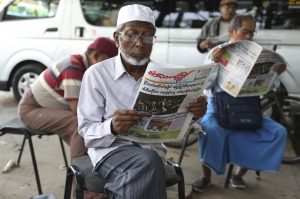Rohingya activists have accused the Myanmar Press Council, a quasi-government media adjudication and ethics body, of defending the practice of using the word “Bengali” to refer to the Rohingya. Rights groups and Rohingya advocates argue that the term amounts to “hate speech” and that it is directly linked to misinformation, “fake news,” and vilification campaigns against the Rohingya actively promoted by the government, the military and others.
Myanmar’s internet and social media landscape has come under increasing scrutiny after a Reuters investigation found over a thousand examples of hate speech attacking the Rohingya and Muslims of Myanmar. Following a UN report’s conclusion that the army had carried out mass killings and gang rapes of Rohingya “with genocidal intent,” a number of social media platforms, including Twitter, Facebook, and Instagram, banned the accounts of Min Aung Hlaing, Myanmar’s army chief, and others in an unprecedented move to control hate speech.
Nay San Lwin, a Rohingya organizer of the Boycott Myanmar Campaign, wants the foreign funding of those local media in Myanmar that continue to use the term “Bengali” to be shut down. “Rohingya worldwide do not accept this name ‘Bengali,’” Lwin explains. “How dare they call us Bengali? We are not Bengali or Bangladeshis.”
He adds,
My great-uncle was a constituent assembly member in 1947, along with Aung San, Burma’s national hero. My two grandfathers were respectively Township Police Officer and Cooperatives Department Head. Another great-uncle was a police colonel and the head of the Police Science Academy. My dad was the township auditor. So how dare they reject my history and label me an illegal immigrant from Bangladesh? Is it because they want to deny our Rohingya existence completely and thus deny us our rights in Myanmar?
Lwin was reacting to U Myint Kyaw, the joint secretary of the Myanmar Press Council, who said he “finds no merit” in Lwin’s demand, as part of the Boycott Myanmar Campaign, that local media in Myanmar cease using the “Bengali” term. Lwin himself was labelled as a “Bengali lobbyist” in the headline of the article in The Speaker where Kyaw made his comments. Zayar Hlaing, secretary of the Ethics Development Committee of the Myanmar Press Council, went further in an interview with News Watch and said that Lwin’s threat to target Burmese language newspapers that use the word “Bengali” for a boycott was inspired by “extremists.”
Myint is unapologetic and unconvinced about Nay San Lwin’s demand. When contacted for comment, he said, “I don’t accept that media using [this term] constitutes hate speech. In Myanmar the usage of ‘Bengali’ is not hate speech in the local language. It means this ethnic group originated in Bangladesh.” He further added that the usage of the word “Rohingya,” on the other hand, reflects a particular “political standing and interest.” When asked if more neutral language should be used, Myint responded, “Media houses could have an editorial policy on which one they use, but I don’t think the press council should regulate the language. Before the communal violence or conflict of 2012, that usage was not an issue among the public or different communities.”
International rights groups like Burma Campaign UK disagree with this assessment. Mark Farmaner, its director, says, “the use of the word ‘Bengali’ to describe Rohingya is a racist and offensive term. It is more than just hate speech. The denial of their identity is part of the genocide against the Rohingya.”
Aye Chan Naing, chief editor of Democratic Voice of Burma (DVB), also agrees that using the word “Bengali” constitutes hate speech. In an email response to the question, “Do you think using the word ‘Bengali’ to describe people who identify themselves as Rohingya amounts to hate speech?” Naing replied, “Yes I do.” When then asked why DVB uses “Bengali” in its local language production, Naing said, “We don’t — but only for direct quotations. We also use the term ‘Rohingya’ for direct quotation too.” However, upon closer examination of the DVB website there were many examples of headlines using the word “Bengali” where no quotation was involved.
The Boycott Myanmar Campaign, according to Lwin, has a number of focus areas but it sees the local press in Myanmar as an important conduit for hate propaganda. It is calling upon governments, NGOs, and development-oriented and press freedom organizations to withdraw financial support from media organs that refuse to drop the term “Bengali” when describing Rohingya. The campaign is drawing up a list of online and print media that engage in the practice, and it is understood that local language versions of the following are included on the list: Eleven, The Voice, DVB, Mizzima, People Media, News Watch, Irrawaddy, The Ladies, and AkonThi.
Members of the Burmese press have anonymously indicated that local commercial media have an “unwritten” instruction from the authorities to use the word “Bengali.” However, it has not been possible to independently verify this claim.
The deterioration of press freedom under Aung San Suu Kyi has been widely noted and commented upon, most recently in a damning report by Human Rights Watch. During Aung San Suu Kyi’s appearance at the International Court of Justice at The Hague, neither she nor her team of international lawyers uttered the word “Rohingya,” preferring to use the word “Muslims” in their submissions to the judges. The term “Rohingya” was mentioned by the Myanmar team only when they were quoting others.
Shafiur Rahman is a documentary film maker who has been working on Rohingya issues for the last three years.

































